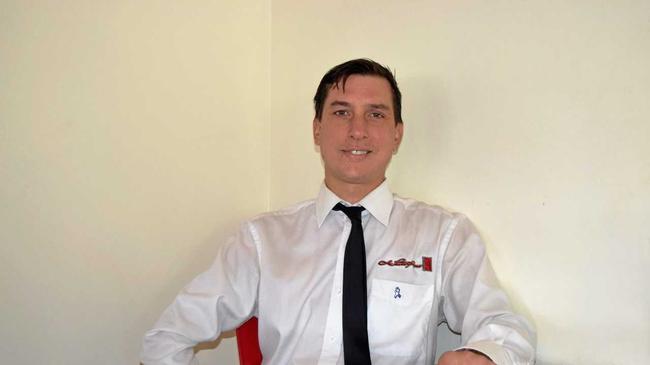How I live with epilepsy
"I try to take it in my stride. I feel that's the best way to deal with it."

Central Queensland
Don't miss out on the headlines from Central Queensland. Followed categories will be added to My News.
BRETT Rose discovered he had epilepsy when he was 16 years old.
He had a seizure while in the school swimming pool in his hometown of Christchurch, New Zealand.
"They found me at the bottom of the pool and they didn't know how long I was there for. They were able to revive me."
Mr Rose said he was sent straight to hospital, and after lots of "umming and ahhing" a diagnosis of epilepsy was given.
"My dad had epilepsy when he was around the same age. Because I'd had no previous seizures and no seizures after that event, I wasn't on medication for about a year.
"Then I had another seizure so they ended up putting me on medication."
Mr Rose, now 36, said he was prescribed medication to take twice daily which was a challenge when growing up with a forgetful teen brain.
"You're going through the teenage years, and you're trying to be a regular teenager, and then you have epilepsy on top of that and you have to remember to take medication - it's just one of those things - it's an extra battle."
Mr Rose, who settled with his partner in Emerald when he was 30, said he's stopped counting the number of seizures he has now had.
"I've had a lot more seizures throughout my years - I've passed counting.
"For me it's not that bad ... it's more scary for the people around me.
"I've got a lot of great people who support me like my fiancé, my parents, and all the people that support me on my journey and I'm really grateful for their help.
"I probably wouldn't be here if it wasn't for them."
Mr Rose said he had his worst seizure when he was 29 and returning back to New Zealand from a month away in South America.
"I was coming through immigration at the airport and had a seizure and bashed my jaw and it split in three."
He now has a metal plate on one side of his jaw pins on the other.
Mr Rose said that to manage his epilepsy efficiently it's essential he maintains adequate sleep levels.
"My medication also makes me more tired than usual and I always need a sleep during the afternoon.
"I need to manage myself, my time and how I look after myself."
Mr Rose said he has worked with a "great epileptologist", or specialist neurologist, in Brisbane who held consultations via Skype.
"I've got a really good doctor here as well."
One thing, he said, the public and anyone unsure about epilepsy could do, would be ask more questions.
He said if people talk to him about epilepsy it helps him feel more confident that the people around him would know what to do if he had a seizure.
He said his boss and colleagues at the Le Porte Rosse restaurant in Emerald, where he has worked for five years and is now bar manager, have been very supportive.
"Different people have different types of epilepsy - some can have epilepsy cured by brain surgery and some people grow out of their epilepsy.
"I got told from a young age that I would probably grow out of it - my dad grew out of his - but mine's been ongoing and will probably be with me all my life.
"I try to take it in my stride. I feel that's the best way to deal with it.
"If you get too worried people around you worry more and it's always on your mind."
Epilepsy Queensland, Mr Rose said, have a Facebook page which he has found enormously helpful and inspirational as others with epilepsy share their stories and struggles and give a platform for people to discuss their concerns.


